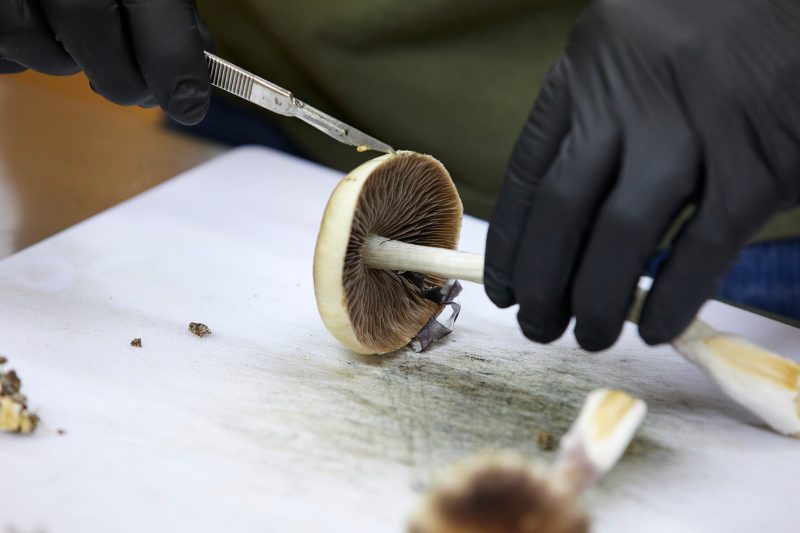Body:
Section 1: Understanding the Importance of Addressing PTSD Among Veterans
Post-traumatic stress disorder (PTSD) is a severe mental health condition that affects millions of people worldwide, including a significant number of veterans. Witnessing traumatic events during their service can lead to long-lasting psychological scars, making it crucial to find effective treatment options. Despite traditional treatments like therapy and medication, many veterans still struggle to find relief from their PTSD symptoms. However, a recent development in the field of mental health research might offer new hope: the usage of psychedelic drugs.
Section 2: The VA’s Interest in Psychedelic Drugs for PTSD Treatment
In recent years, numerous studies have explored the potential benefits of psychedelic substances, such as psilocybin (found in magic mushrooms), MDMA (commonly referred to as ecstasy), and ketamine, in the context of mental health disorders. The Department of Veterans Affairs (VA) has taken notice of this research and is considering using psychedelic drugs as part of their treatment approach for veterans with PTSD.
Section 3: The Promising Results of Psychedelic Therapy
One of the primary reasons the VA is considering psychedelic drugs is due to the promising results seen in various studies. For example, research on psilocybin-assisted therapy has shown significant reductions in PTSD symptoms, often with longer-lasting effects compared to traditional treatments. Similarly, MDMA-assisted therapy has demonstrated encouraging results, with veterans experiencing improvements in their PTSD symptoms and an increased ability to engage in therapy.
Section 4: The Need for Controlled Usage and Research
While the potential benefits of psychedelic drugs for PTSD treatment are evident, it is essential to approach this approach with caution. The use of psychedelic drugs must be hyper-controlled, with strict guidelines in place to ensure the safety and well-being of the veterans involved. Rigorous research and clinical trials are necessary to gather sufficient evidence and data to determine the ideal dosage, administration methods, and potential long-term effects of psychedelic therapy.
Section 5: Overcoming Stigma and Legal Barriers
In addition to the need for careful research, there are undoubtedly numerous challenges associated with implementing psychedelic therapy within the VA’s current framework. Societal stigma surrounding psychedelic drugs may hinder acceptance and support for this alternative treatment approach. Moreover, legal barriers and regulations may impede the availability of psychedelic-assisted therapy for veterans. Overcoming these hurdles will require education, advocacy, and open-mindedness from both the medical community and policymakers.
Section 6: Collaborative Efforts and Multidisciplinary Approach
To successfully incorporate psychedelic therapy into the VA’s PTSD treatment options, collaboration between various stakeholders is essential. Close cooperation between mental health professionals, researchers, and policymakers is crucial for developing comprehensive guidelines and protocols. It is crucial to consider the physical and mental health of veterans while navigating potential drug interactions and contraindications that may arise from combining psychedelic therapy with existing medications and treatments.
Section 7: Providing Holistic Support for Veterans
While the potential benefits of psychedelic drugs are promising, it is crucial to acknowledge that they are not a panacea for PTSD. Implementing psychedelic therapy within the VA should be part of a more comprehensive approach to supporting veterans’ mental health. This approach should include a range of evidence-based treatments, including therapy modalities that address trauma, such as cognitive-behavioral therapy (CBT) and eye movement desensitization and reprocessing (EMDR). Moreover, a holistic support system that considers the social, physical, and emotional needs of veterans should be in place.
Section 8: Conclusion (Don’t include conclusion at the end)
In conclusion, the exploration of psychedelic drugs as a potential treatment for PTSD among veterans is an exciting development in the field of mental health research. However, further research, careful implementation, and collaboration are necessary to ensure the safe and effective usage of these substances. By approaching psychedelic therapy with caution and incorporating it into a comprehensive treatment approach, the VA can potentially offer new hope and relief to veterans struggling with the debilitating effects of PTSD.

